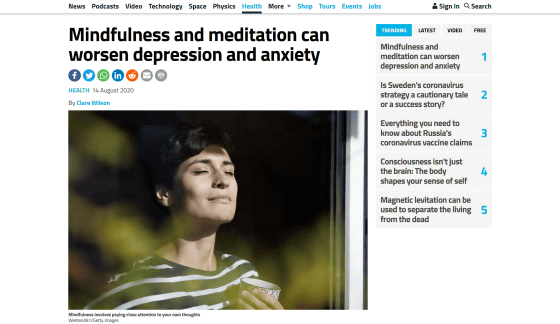'Meditation can also exacerbate depression and anxiety'

meditation It is said that
Mindfulness and meditation can worsen depression and anxiety | New Scientist
https://www.newscientist.com/article/2251840-mindfulness-and-meditation-can-worsen-depression-and-anxiety/

Mindfulness, which concentrates on one's situation, emotions, and breathing through meditation, etc., has become popular because Google has taken it into the training. Research has already been conducted to examine the effects of meditation, including mindfulness, from a scientific perspective, and it has been reported that meditation reduces stress and improves learning performance.
The UK's National Health Service (NHS) also introduces mindfulness, saying that using mindfulness can prevent depression from recurring in people who have had a few past attacks. .. People with mental illness are interested in meditation because they are more concerned about the side effects of antidepressants, and some people say, 'I am dependent on antidepressants and take them after treatment.' It may be because I am reporting 'I can not stop it.'

On the other hand, it has been confirmed that people who meditate report discomfort, and it is pointed out that meditation may not always bring benefits. Farias and his team found 55 related studies in various medical journals, and ruled out how many people were hurt by meditation in each study, excluding those who were deliberately trying to discover the negative effects of meditation Was calculated.
As a result of the analysis, the research team found that about 8% of people who meditated had an unwanted effect. 'People have gone through everything from increased anxiety to panic attacks,' Farias said, and in some cases, they have mental anomalies and a desire to die.
Since the study on meditation may report only serious adverse effects or may not mention adverse effects, the ratio of 8% calculated in this study is higher than the ratio of those who actually experienced adverse effects. May be less.

Katie Sparks, a member of the British Psychological Association , said the 8% figure calculated by Farias's research team may have been pushed up by people who had depression and anxiety that were undiagnosed at the time of the study. Pointed out that there is. “We know that meditation helps people relax and refocus, mentally and physically,” said Sparks.
On the other hand, when people try to stop their thoughts during meditation, the spirit may rebel. 'It's like a reaction to an attempt to control the mind, which leads to episodes of anxiety and depression,' Sparks said, admitting that meditation can also have a negative effect.

Related Posts:
in Note, Posted by log1h_ik







